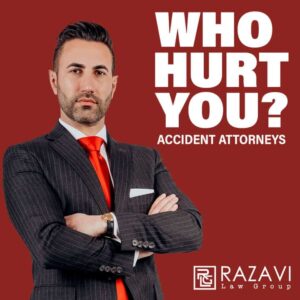
How Much Is A Wrongful Death Lawsuit Worth In California?
A Guide to Navigating a Wrongful Death Claim Wrongful death lawsuits are legal remedy that allows surviving family members to seek compensation for damages resulting
Razavi Law Group are top-rated wrongful death attorneys in California, and surrounding areas. At RLG, we are here to ensure that you and your family receive the justice you deserve as we hold those responsible for the unexpected passing of your loved one.
Coping with the loss of a loved one can be one of the most trying times of your life. When your family member’s death was caused by another party’s negligence or wrongdoing, the grieving process only intensifies In these instances, you may have the right to file a wrongful death lawsuit and receive the closure and financial compensation to which you and your family are entitled.
A death in ones family is always tragic, especially when that loss is unexpected and is due to a persons’s or company’s negligence. A wrongful death claim is when someone wrongful or unexpectedly dies due to the carelessness or wrongful of another person or company. Much like people can file a claim for being injured, the family of a wrongfully deceased person can also make a claim on their behalf. At Razavi Law Group, we are here to ensure that you and your family receives the justice you deserve as we hold those responsible for the unexpected passing of your loved one.

Wrongful death is a legal term that refers to a claim brought by the surviving family members or beneficiaries of a person who died due to the negligence, recklessness, or intentional actions of another individual, company, or entity. In such cases, the death is considered “wrongful” because it was preventable and would not have occurred if not for the wrongful conduct of the responsible party.
Wrongful death claims are civil lawsuits seeking to hold the at-fault party legally accountable for their actions and to provide compensation to the surviving family members for the losses they have suffered as a result of the death. The compensation may cover various damages, including medical expenses, funeral and burial costs, lost income and financial support, loss of companionship and consortium, and emotional pain and suffering.
The laws and procedures surrounding wrongful death claims vary by jurisdiction, and the eligible parties who can file such claims may differ as well. In many cases, wrongful death claims are brought in cases of car accidents, medical malpractice, workplace accidents, defective products, and other situations where the negligence or misconduct of another party led to the death of an individual.
Pursuant to California Code of Civil Procedure Section 377.60, the following parties may bring a wrongful death claim:
People who would be entitled to the deceased’s property as if he or she did not have a will;
The deceased’s putative spouse, the children of the putative spouse, parents, or stepchildren of the deceased;
A minor that resided with the deceased for 180 days in the deceased’s home and was dependent on him or her for at least half of their support; or
A personal representative of the deceased.
If you think you have a wrongful death case please do not hesitate to call Razavi Law Group with any questions you may have. We are here to help you and your family receive the justice and compensation you and your family so rightly deserve.
Common causes of wrongful deaths include:
To prove a wrongful death claim in California, the plaintiff (the party bringing the lawsuit) must establish certain elements to demonstrate that the death was indeed caused by the negligence, recklessness, or intentional actions of the defendant.
Here are the key factors that need to be proven in a wrongful death claim in California:
To support a wrongful death claim, gathering evidence is crucial. This may involve obtaining accident reports, medical records, witness testimonies, expert opinions, and other relevant documentation to establish the defendant’s liability and the damages suffered by the surviving family members.
The value of a wrongful death claim in California can vary significantly depending on several factors that are considered when determining compensation. Some of the key factors that may affect the worth of a wrongful death claim include:
In a wrongful death lawsuit in California, the compensation awarded, also known as damages, is typically distributed to the surviving family members or beneficiaries who are considered “real parties in interest.” The distribution of the damages is governed by the California Code of Civil Procedure Section 377.60.
The following individuals are generally eligible to receive the compensation from a wrongful death lawsuit in California, listed in order of priority:
If none of the above-mentioned individuals exist, the right to receive the damages extends to individuals who would be entitled to the deceased person’s property under California intestate succession laws (laws that govern the distribution of property when there is no will).
It’s important to note that the court will determine the allocation of damages if there are disputes among the eligible parties. Additionally, the actual distribution of the damages may be affected by any existing debts or liens against the deceased person’s estate.
In California, the statute of limitations for filing a wrongful death lawsuit is generally two years from the date of the deceased person’s death. This means that the lawsuit must be initiated within two years of the death, or the right to pursue a claim may be lost. There are some exceptions and circumstances that may affect the statute of limitations:
Discovery Rule: In certain cases, the statute of limitations may begin from the date the cause of death was discovered or reasonably should have been discovered, rather than the actual date of death. This rule is applicable when the cause of death is not immediately apparent.
Government Entity Involvement: If the wrongful death claim involves a government entity, such as a city or county, the process may be subject to special rules and shorter time frames for filing a claim. It is essential to be aware of these specific requirements when dealing with government-related claims.
Tolling of Statute: Under specific circumstances, the statute of limitations may be “tolled” or temporarily suspended, extending the time frame to file a lawsuit. Tolling may occur if the defendant is absent from the state or in certain cases involving minors or individuals with disabilities.
Given the strict time constraints involved in filing a wrongful death lawsuit, it is crucial to act promptly and consult with an experienced wrongful death attorney as soon as possible. An attorney can assess the details of the case, determine the applicable statute of limitations, and guide you through the legal process to ensure your rights are protected and that you have sufficient time to pursue your claim. Waiting beyond the statute of limitations could result in the forfeiture of your right to seek compensation for the wrongful death of your loved one.
Yes, in California, you can seek punitive damages in a wrongful death case under certain circumstances. Punitive damages are different from compensatory damages, which are meant to compensate the surviving family members for the losses resulting from the death. Instead, punitive damages are intended to punish the at-fault party for their egregious behavior and to deter similar conduct in the future.
To seek punitive damages in a wrongful death case in California, you must demonstrate that the defendant’s actions leading to the death involved either:
While punitive damages can significantly increase the potential value of a wrongful death claim, they are not awarded in all cases. The decision to award punitive damages is at the discretion of the court or jury based on the evidence and arguments presented during the trial.
A California wrongful death attorney can provide essential assistance and support in navigating the legal complexities of a wrongful death claim. They can:
Having a skilled wrongful death attorney by your side can alleviate the burden of legal matters, allowing you and your family to focus on healing and coping with the loss.
If you have a wrongful death case in California, reach out to Razavi Law Group today. With our extensive experience and dedicated team, we stand ready to guide you through every step of the process, fight for your rights, and help you seek the compensation you deserve. Contact us now for a free, no-obligation consultation. We’re here for you, ready to make a difference in your case.
Santa Ana | Las Vegas | Orange County | Bakersfield | Mission Viejo | Riverside | Anaheim | West Hollywood

A Guide to Navigating a Wrongful Death Claim Wrongful death lawsuits are legal remedy that allows surviving family members to seek compensation for damages resulting

Navigating the Legal System After a Wrongful Death Tragedy Losing a loved one due to wrongful death is a tragedy that no family should ever

Compensation In A Wrongful Death Lawsuit In California Wrongful death lawsuits are filed when someone has died due to the negligence or wrongful act of

What is a Wrongful Death Claim? A wrongful death lawsuit is a legal action filed by survivors of a deceased person who lost their life
Our attorneys are experienced in all major areas of Personal Injury & Employment Law.
** THIS WEBSITE IS ATTORNEY ADVERTISING. NO ATTORNEY-CLIENT RELATIONSHIP NOR PRIVILEGE IS FORMED BY AND THROUGH THE USE OF THIS WEBSITE. **
The information on this website is for informational purposes only and not to be construed as legal advice. This information is not intended to create, nor does receipt of or viewing constitute an attorney-client relationship. You are not considered a client until Razavi Law Group has accepted your case and a client retainer has been signed.
Copyright 2023 | All Rights Reserved | Privacy Policy | Sitemap | Powered by: Acute Personal Injury Lawyer SEO Santa Ana